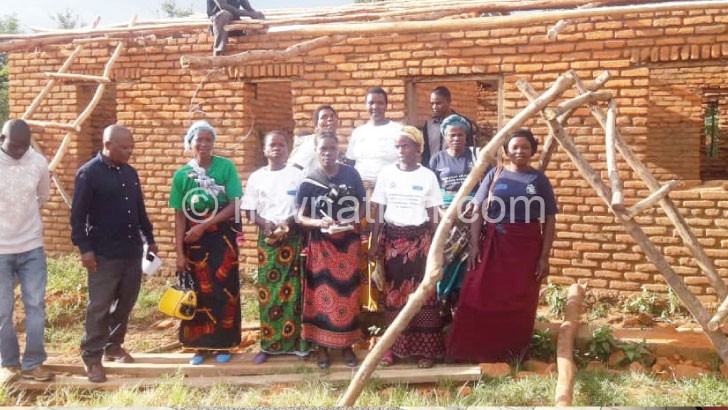Mothers build houses for rural health staff
Mphanga and Tsekwe villages resemble many rural parts of Mchinji.
The hard-to-reach settings in the western border district are serene, with children at play. However, not all is well as access to quality healthcare services, including vaccines, is not easy. The villagers, mostly women, endure long travels to get their children vaccinated.
To ensure every child aged below five gets a healthy start in life, concerned women are championing immunisation for all.
The mother care groups trained by Malawi Health Equity Network (Mhen) constantly walk long, going door to door to remind parents to take their children for immunisation.
They have since constructed two houses for health surveillance assistants (HSAs) to end long walks to under-five clinics.

Beatrice Banda, chairperson of Mphanga Mother Care Group around Chiosya Health Centre in Traditional Authority (T/A) Simphasi, says the community health workers were constantly absent from the monthly clinics.
“This affected our work as foot soldiers because people who brought children for immunisation often returned home frustrated. After the training, we employed one of the lessons to mobilise resources locally,” she says.
HSAs provide immunisation in remote communities, but they mostly lack decent housing in areas they work.
“After realising that our HSA was constantly absent due to lack of accommodation, we engaged community leaders to raise funds for the construction of the house,” Banda says.
Florence Khonyongwa, Mhen monitoring and evaluation officer, hopes other communities will emulate this example instead of waiting for donors and government intervention.
“We want to reach every corner of the country with key messages on the importance of vaccines. However, some areas are hard-to-reach, making it difficult for health surveillance assistants and mother care groups to effectively carry out their duties,” she says.
Edward Jere, deputy director of the National Expanded Programme on Immunisation in Mchinji, thanks the volunteers for helping confront lack of decent housing for HSAs, myths and religious teachings against vital vaccines.
“The housing project is what others can only dream of. Mphanga and Tsekwe mother groups did not do this on their own, but with the help of traditional leaders and their partners,” explains Jere.
Lawrence Kampingo, an HSA based at Chiosya, used to cycle almost 50 kilometres from his home in Chimuti Village to Mphanga Under-Five Clinic near the border between Mchinji and Lilongwe. The terrain between Matutu and Mphanga is tricky. The hilly earth road becomes impassable when it rains.
“Sometimes I am absent for several months from my normal duties due to mobility and accommodation challenges. I sometimes seek the help of a fellow HSA from Chiosya Health Centre to vaccinate children. I thank the mother group for the house,” says Kampingo.
They work closely with the mother groups to monitor monthly progress in numbers of vaccinated children.
The volunteers feel proud of what they have achieved.
They believe vaccines are vital to safeguard children from preventable diseases.
Evelyn James, from Tsekwe Village near Kapiri Health Centre in T/A Dambe, says the door-to-door visits and community mobilisation campaigns spiced up with traditional dances have dramatically increased the number of children getting vaccinated per month.
“I used to be a defaulter and my daughter was constantly sick because she missed some vaccines. After receiving training from Mhen, I am a proud mother of a healthy child,” she says.
The woman has made it a mission to senstise her neighbours to the importance of immunisation.
Her group has constructed a house for an HSA at Tsekwe Under-five clinic.
This exemplifies the mother group’s determination to identify prevailing setbacks to immunisation and solutions that work in their communities.
Apart from immunisation, the two houses will improve the communities well-being as the HSAs also provide multiple services, including nutrition, modern family planning, hygiene promotion and health education.





